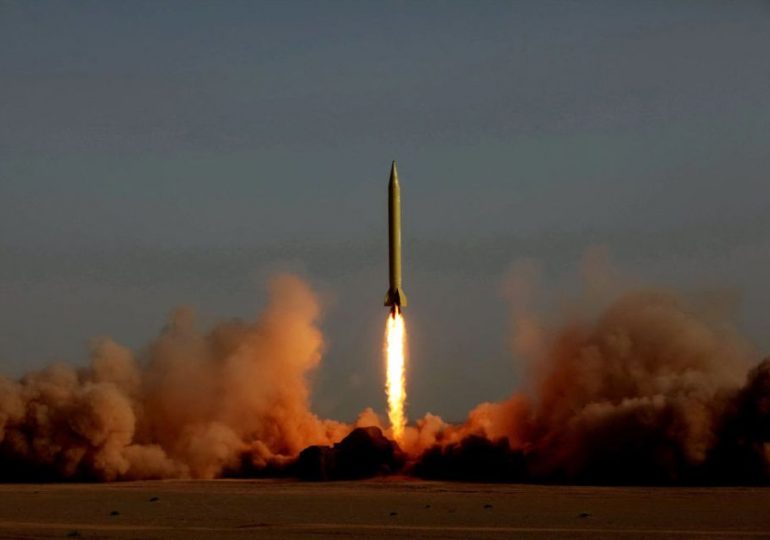IRAN has unveiled a terrifying range of missiles that are capable of crossing the Red Sea and hitting sworn-enemy Israel.
Tehran also vowed that Benjamin Netanyahu will “regret” the strike on Iran‘s consulate in Syria that saw several killed.
AFPIran unveiled its terrifying range of missiles that are capable of hitting Israel[/caption]
Pacific Press/LightRocket via GeMost of Tehran’s terror collection can reach a chilling range of 1242 miles[/caption]
ISNA, Iran’s semi-official news agency, issued a graphic showing nine different types of Iranian missiles capable of reaching Israel.
With some being able to fly at a top speed of 560mph, most of Tehran’s terror collection can reach a chilling range of 1242 miles.
On Saturday, the Iranian army‘s chief of staff promised Israel will “regret” a strike on Iran’s consulate in Syria.
The airstrike, widely blamed on Israel, saw two senior military commanders killed alongside five other officers.
In all, 12 people were killed in the strike: Seven Iranian Revolutionary Guard members, four Syrians and a Hezbollah militia member.
Gen. Mohammad Bagheri, told mourners gathered for the funeral of Gen. Mohammad Reza Zahdi that Iran will decide when and how to stage an operation to take revenge.
Zahdi was the highest ranking commander slain in Monday’s attack.
“The time, type, plan of the operation will be decided by us, in a way that makes Israel regret what it did,” he said.
“This will definitely be done.”
He added that the Israeli attack would not go unanswered and “that Iran would carry out a retaliatory operation with precision, causing the Zionist regime to regret their actions”, Al Jazeera reports.
The Iranian consulate in Syria (pictured) was reduced to rubble following an airstrike
ReutersTehran has since vowed revenge for the attack, saying that Benjamin Netanyahu ‘will regret’ the strike[/caption]
ReutersIran and Israel have had a tense history for years[/caption]
Major General Bagheri went on to describe the attack on Iran’s embassy as a “suicide” mission by Israel.
Another senior Iranian official said none of Israel’s embassies are safe anymore following the consulate blast in Damascus.
Some 28 Israeli embassies around the world temporarily closed on Friday due to fears of retaliation from Iran, the official said.
Yahya Rahim Safavi, an adviser to the Supreme Leader, said the attack was a “violation of international laws”.
Tensions have flared against the backdrop of the six-month-old Israel-Hamas war in Gaza, and raised renewed fears of a broader regional conflict.
Hamas, which has ruled Gaza for 17 years, is one of Iran’s proxies, along with Lebanon’s Hezbollah terror group and Yemen‘s Houthi rebels.
Both Hezbollah and the Houthis have carried out attacks along the fringes of the Gaza war, with Hezbollah engaging in daily cross-border exchanges with Israel and the Houthis frequently targeting Red Sea shipping.
The attack on the Iranian diplomatic compound was a significant escalation in a long-running shadow war between the two archenemies, and Israel has been bracing for an Iranian response.
Israeli Prime Minister Benjamin Netanyahu has vowed on Sunday that his forces are “one step from victory” over Hamas.
He was speaking as the IDF announced they were pulling troops out of South Gaza in what sources described as an “operational” move.
Netanyahu however vowed there would be no ceasefire as he addressed his cabinet.
“We are one step away from victory. But the price we paid is painful and heartbreaking,” he said.
“There will be no ceasefire without the return of hostages. It just won’t happen.”
Meanwhile, the Israeli Defence Force (IDF) announced they were pulling troops out of South Gaza.
Israeli troops have been fighting a bloody battle in Khan Younis – which they say is one of Hamas’ strongholds – for months.
The withdrawal however is said to be tactical and operation grounds, an Israeli official told Haaretz.
The source said: “[We] dismantled Hamas’s Khan Yunis brigades and killed thousands of its members.
“We did everything we could there.”
The history of Israel and Iran’s relationship
THERE’S been an ongoing conflict between Israel (left) and Iran (right).
In 1947, Iran was among 13 countries that voted against the United Nations Partition Plan for the British Mandate of Palestine.
Two years later, Iran also voted against Israel’s admission to the United Nations.
After the 1979 Islamic Revolution, Iran severed all diplomatic and commercial ties with Israel, and its theocratic government does not recognise the legitimacy of Israel as a state.
The turn from cold peace to open hostility began in the early 1990s, shortly after the collapse of the Soviet Union and the defeat of Iraq in the Gulf War, after which relative power in the Middle East shifted to Iran and Israel.
CONFLICT ‘HEATS UP’
The conflict escalated in the early 1990s, as Yitzhak Rabin’s government adopted a more aggressive posture on Iran.
Rhetorical conflict heated up during the presidency of Mahmoud Ahmadinejad, who made inflammatory statements against Israel.
Other factors that have contributed to the escalation of bilateral tensions include Iran’s development of nuclear technology relative to Israel’s long-stated Begin Doctrine, Iran’s funding of Islamist groups such as Hezbollah, Palestinian Islamic Jihad and Hamas, as well as alleged involvement in terrorist attacks such as the 1992 attack on Israeli embassy in Buenos Aires and the 1994 AMIA bombing, and Israel’s alleged support for militant groups such as the People’s Mujahedin of Iran and Jundallah as well as alleged covert Israeli operations in Iran including multiple assassinations and bombings.
‘COMPLEX AND ONGOING’
Since 1985, Iran and Israel have been engaged in an ongoing proxy conflict that has greatly affected the geopolitics of the Middle East, and has included direct military confrontations between Iranian and Israeli organisations, such as in the 2006 Lebanon War.
The conflict has played out in various ways, including through support for opposing factions in conflicts in Syria and Yemen.
Iran has provided support to the Syrian government, while Israel has supported opposition groups.
In Yemen, Iran has provided support to the Houthi rebels, while Israel has provided support to the Saudi-led coalition fighting the rebels.
The conflict has also involved cyber attacks and sabotage against each other’s infrastructure, including attacks on nuclear facilities and oil tankers.
Overall, the Iran-Israel proxy conflict is a complex and ongoing conflict that has had a significant impact on the political and security dynamics of the Middle East.
INSIDE THE WAR
In the Israeli–Lebanese conflict, Iran has supported Lebanese Shia militias, most notably Hezbollah. In the Israeli-Palestinian conflict, Iran has backed Palestinian groups such as Hamas.
Israel has supported Iranian rebels, such as the People’s Mujahedin of Iran, conducted airstrikes against Iranian allies in Syria and assassinated Iranian nuclear scientists. In 2018 Israeli forces directly attacked Iranian forces in Syria.
Iranian Islamists have long championed the Palestinian people, whom they perceive as “oppressed”.
Scholars believe that by supporting the Palestinians, Iran seeks greater acceptance among Sunnis and Arabs, both of whom dominate the Middle East.
Ideologically, Iran seeks to replace Israel with a one-state solution and has predicted Israel’s demise. Israel sees Iran as an existential threat, and accuses its regime of harbouring genocidal intentions.
Consequently, Israel has sought sanctions and military action against Iran to stop it from acquiring nuclear weapons.
APEmergency crews working at the site in Damascus[/caption]
IRGCOne of Iran’s top generals Mohammad Reza Zahedi was killed in the blast[/caption]
Leave a comment








